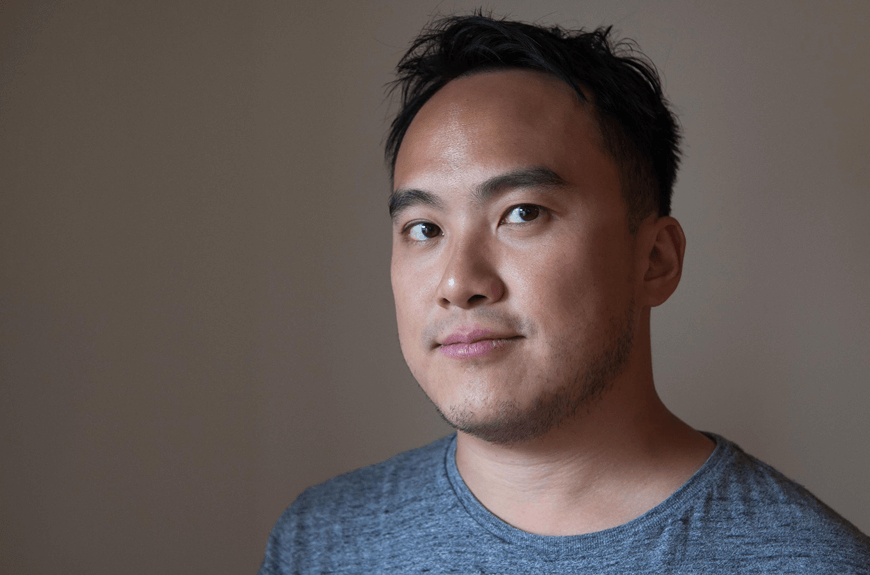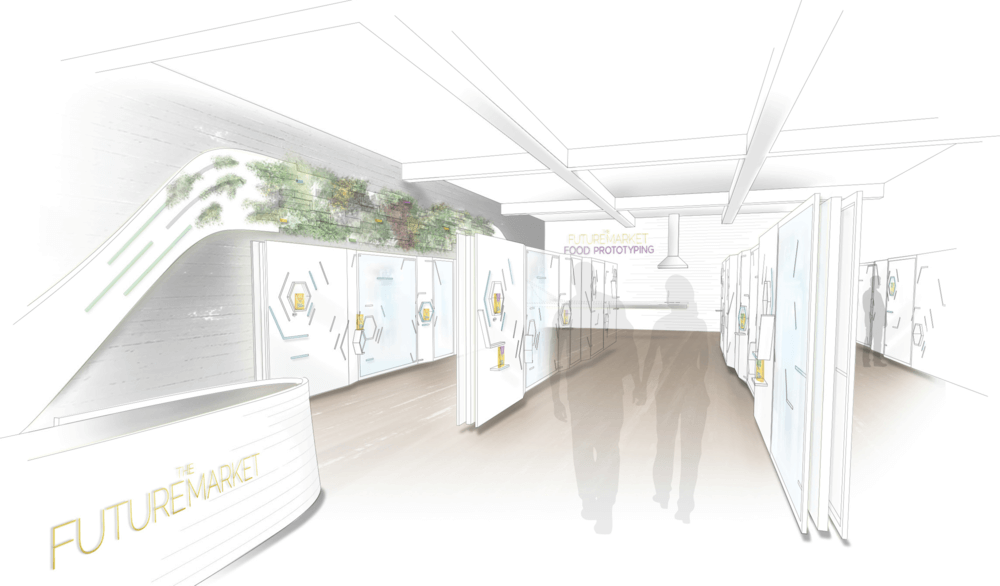Plant Chat: Mike Lee, Food Futurist

It’s so great to have Mike Lee, founder of The Future Market, on my Plant Chat today. I saw Mike speak at the Sustainable Agriculture Summit last fall on future food trends and sustainability and was just blown away by his creative spirit. The Future Market is a futurist food lab that explores what our food system could look like in the next 10-25 years through pop-up experiences and conceptual product prototypes. Mike is also co-founder of Alpha Food Labs, an Innovation Lab for next-gen food startups and corporations building products that are better for by People, Planet, and Profit.
I really love how Mike forecasts The Future of Protein in this video (guess what, it’s all about plants!) from the inaugural event in their Future of Food dinner series, so please check it out. In addition to these incredible business ventures, Mike founded the Studiofeast underground supperclub, a sister organization to Studio Industries. Studiofeast creates unique dining experiences that use food as a medium to design experiences that range from the artful, to the educational, to the hedonistic. He now lives in Brooklyn, NY. Continue reading to learn more about Mike’s thoughts for future food trends and plant-based eating.
How did you get started down the path of being a food trend expert?
It started with working in innovation in food. Since 2007, I have worked in deferent capacities with food—my last formal job was with Chobani in an innovations group. We worked on a new platform development, and I was charged at figuring out what the unmet needs were in food. I always had a predilection towards looking ahead and at food trends.
I started my agency to do product development and strategy with food companies. I was thinking, what way could I prove to the world what the evidence of my thinking was as a new agency? Without a portfolio, besides the Chobani stuff I had been doing, it was hard to pitch myself. I created the future market as a part of the way to create an alternative reality to demonstrate my thought process. I look to where people today head out to see the future. That’s where I go for inspiration, such as the Auto Show. I took it to heart.
I looked at big food shows, and how innovation meant something different in the food world than outside that world. A very subtle packaging tweak is an innovation, a 100-calorie pack is an innovation. I wanted to push on this a little harder. Why isn’t food innovating as hard as tech or the auto industry? The spirit is to create this oasis, not bogged down by the normal course of doing business, but to think freely about where we end up in the future. To create an aspirational platform, and ask if we can we get companies making food for today’s world to reverse the way they’ve been doing things.
For three and a half years I’ve had my own agency, with over two dozen clients. I work on various capacities, doing a wide range of stuff. It roughly breaks into two categories: teaching innovation through workshops and training, and empowering companies to innovate better themselves. Companies come to us with open-ended challenges, asking what should we make next? They don’t know how to go after a consumer. It’s about what opportunities we can create to go after.
What are some of the top food trends you are seeing today?
The trend that is the most meaningful in the short term and long term is the whole plant-based trend.
Uniquely in plant-based foods, the gap is close between taste and promise. Plant-based diets re always healthier and more sustainable than meat-based diets. We’ve had veggie-burgers since forever, but we have different technology to coax out more flavor our of vegetables, which has big ramifications. Now we can go after people who aren’t vegans and vegetarians. That’s an interesting trend going on right now.
One of the other trends, we see as a little bit more opaque, is that big companies are acquiring small companies right now. We start to see investment opportunity in personalized nutrition, such as Campbell’s investment in Habit, which is a sign towards trying to get to a place of 1 for 1 food for an individual; we may not get there, but food companies are not viewing the audience as a monolithic sector, and at least as tribes, and on an individual level. It’s exciting to see what happens in the next five years and see how this fleshes out in a number of ways.
I was at an cellular agriculture conference, and I think that’s more interesting in terms of the value system of food. It can confuse people, because we have never seen anything like it. If you are against crueler things like foie gras, what if you could grow it in a lab without killing an animal? How would you feel about it? People want natural and more unprocessed foods, but what if it means saving resources and land? The farming industry is causing us to rethink our value system; it’s a really exciting space to watch over 10 years.
What is pushing consumers to make these choices?
There are a bunch of things. At the base layer is the fact that we are digitally networked by default and tribe. Even though we are scattered across the country, it is a convenient and powerful place to gather. The digital environment is fertile for a tribe to exist and have a mass reaction to things like big food, the perils of processed foods, and health issues, from IBS to food allergies. There has never been more of these convenient ways to cluster around issues and make an impact that is felt by the food industry.
Another thing is that how we identify food is becoming our identity.
We don’t touch our food where it’s made anymore, and we have an innate longing to be a part of it. The meal kit phenomenon is a perfect example of this. It is the personification of the need to feel like we touch our food and are a part of it, without being a farmer.
There is so little we can control in the world, and food is one thing we can control and use as a tool of self-expression.
It is the confluence of all those things driving the evolution of food and splintering us into these tribes. As a result, the big food shows grow every year. More and more tribes are empowered to support food entrepreneurs and products—they are driving that. It gets harder and harder to digest. Large food companies buy smaller ones and take a hands off approach at running them. They are trying to figure out how to innovate internally again. The prices they pay for small companies is getting ridiculous. It puts unrealistic growth goals on the company, and creates a negative environment.
Overall the trend is moving more plant-based. Beyond Meat and Impossible Burger are not “clean label” products, but they turn on an image in the public mindset. They are firmly targeted to meat eaters, to shift their mind set, and hope to create ageneral interest in plant-based eating, starting off with eating a Beyond Burger, then they can move to a cleaner label product.

How are consumers making more sustainable food choices in food aisles?
I think more attention needs to be paid to this, as most marketing is geared towards what it’s doing for a person, there is an opportunity to democratize what you see. Ideas like Indie Chefs and Rotation Risotto look to the pattern of nature, biodiversity, and eating with the seasons. These ideas are beginning to bubble up, but they have not caught on yet with the mainstream, they are more journalistic. But imagine what things we could do. We can advocate for more of these ideas. Could we see that the paradox? Big food is built on the idea that you can have anything you want any time of the year, which has created a domino effect of our monoculture system, dependence on fertilizers and pesticides. We can make people understand the simple idea of eating seasonally. We can demand our suppliers and providers of food, that it’s not ok to have a fresh tomato in January. Again, this is in the op ed category, it’s not a main stream talking point. We need to spread the gospel of what that is. It’s the next big frontier; the food industry as a whole can start to get that conversation out a little bit more in the public and open up the conversation around climate change. This is a macro trend, and how food as an industry plays into that is a problem. We have to find a way to get to a more enlightened place on that. The onus is on big food companies.
How big is the plant-based movement today?
People can eat a majority of plant-based meals, and then eat less, better meat, which is more flavorful, and you need to use less of it. Meat becomes the garnish, plants are the main sustenance.
Food trends start when something is delicious, it gives you permission to talk about other benefits around it. Some of the most interesting restaurants are vegetarian or completely plant-based. Stuff starts out with high end chefs, then it starts to go to the mainstream. It trickles down a little bit deeper. Chefs are seeing plant-based cuisine as a true mark of a talented chef, it doesn’t make much effort to make bacon and foie gras taste good. We think there is potential here.


